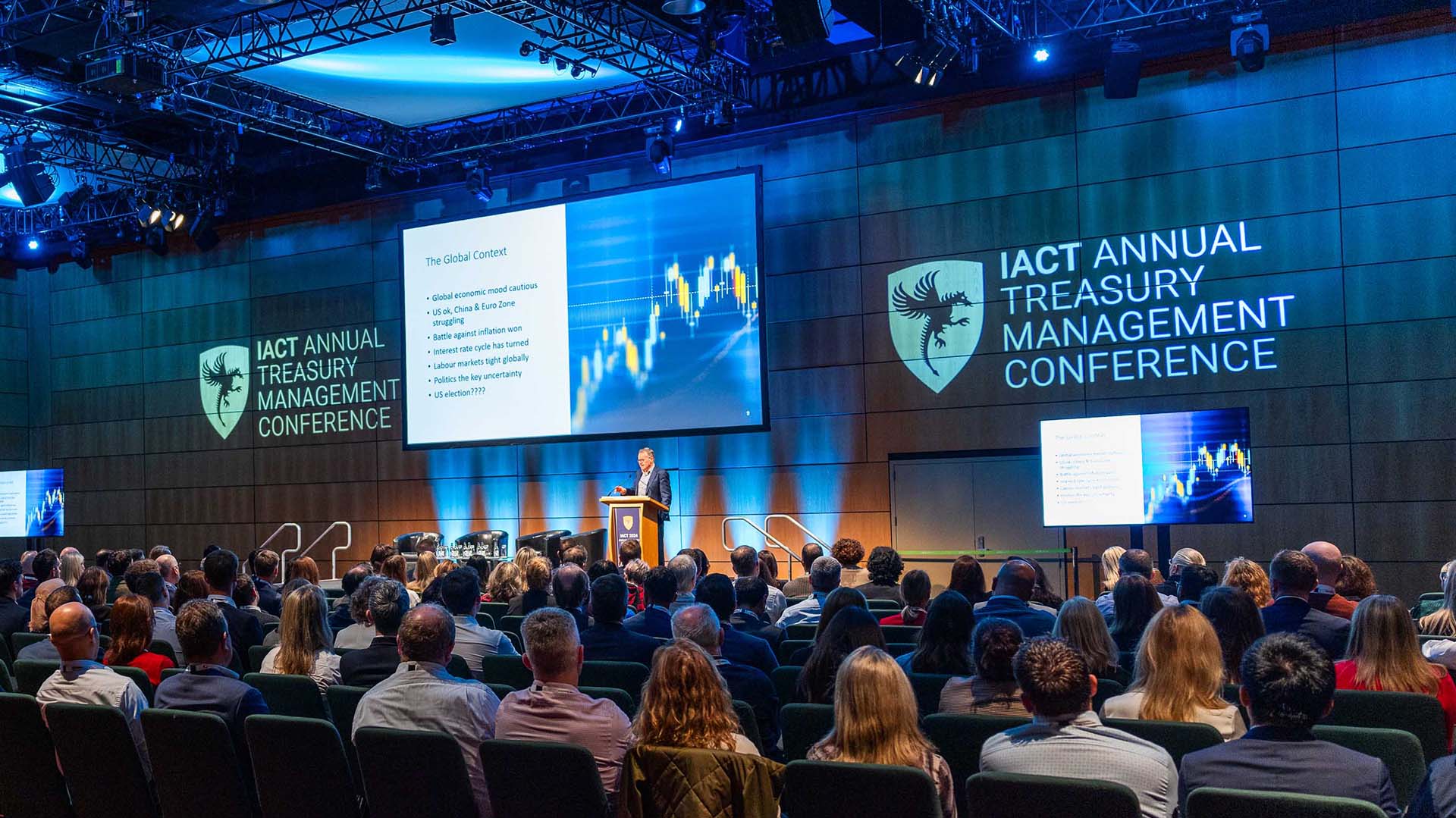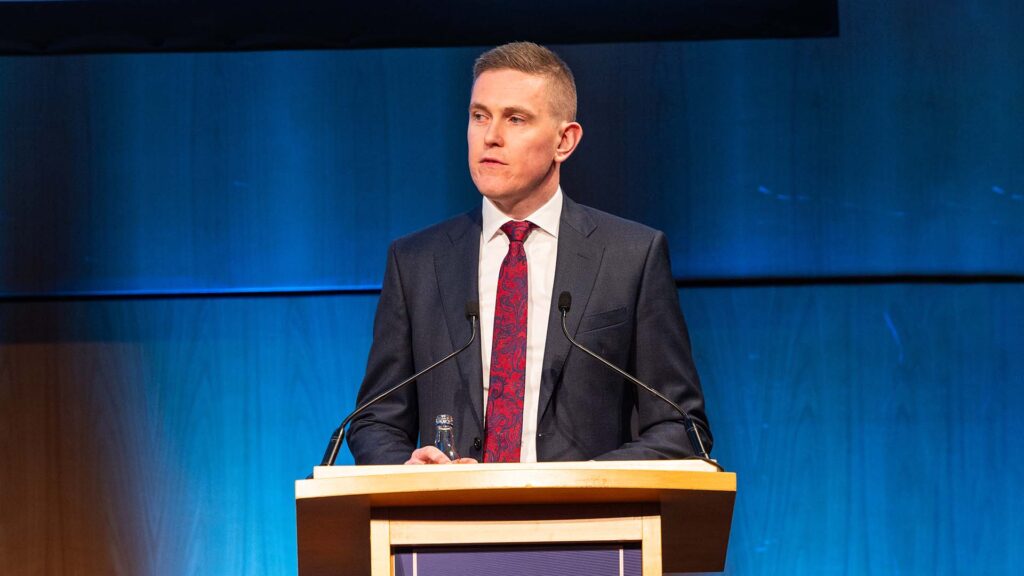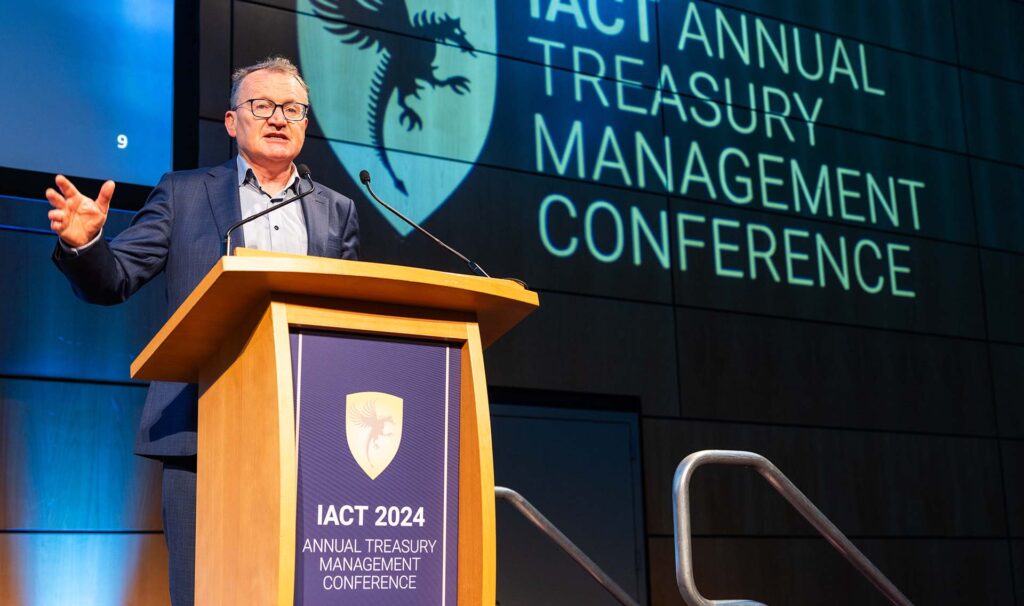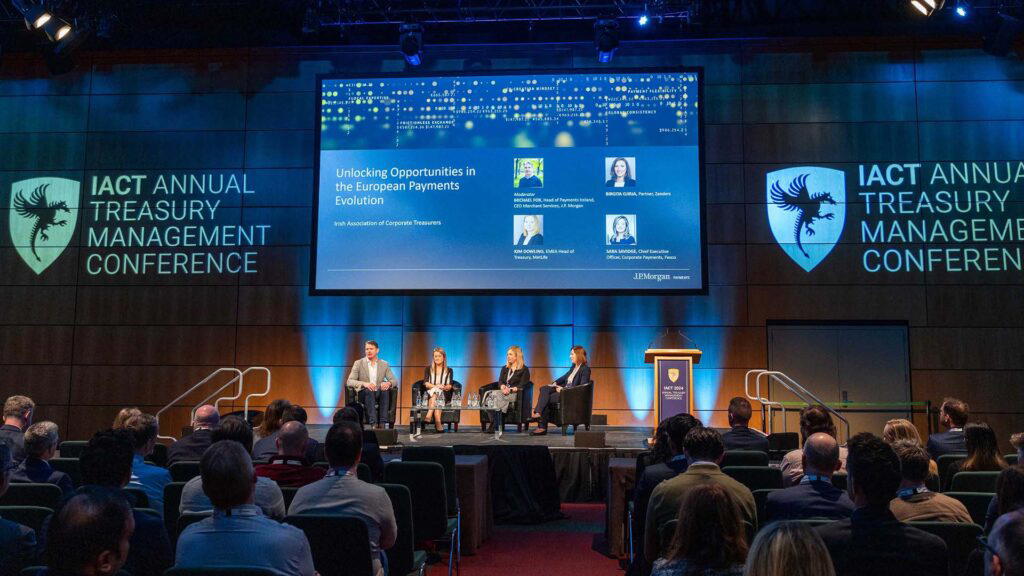
From politics and payments, to hackers and hypnotism, the IACT Annual Treasury Management Conference covers it all…
The Irish Association of Corporate Treasurers (IACT) held its Annual Treasury Management Conference on November 13 and 14, 2024. The first morning – pre-conference – was devoted to the popular IACT Academy, aimed at those new to treasury and others who want to expand their knowledge in order to advance their careers. This was followed in the evening by the traditional pre-conference networking reception, with both events taking place in Dublin’s EPIC Irish Immigration Museum.
The pre-conference networking reception saw the presentation of the 2024 IACT Awards by John James Dunne, IACT President. Highly Commended awards were given to Equifax and Fexco, with Viatris taking home the Winner accolade.
On conference day proper, delegates met at the Convention Centre Dublin for a programme of panel discussions covering a range of topics high on treasurers’ current agenda, each conducted by leading experts in the profession.
The conference was hosted by IACT President John James Dunne, who welcomed delegates and guests and introduced the keynote speaker, Jim Power, Founder, Jim Power Economics. Power gave an overview of the global economic backdrop, examining the factors that have influenced it including the global financial crisis of 2008, unusual monetary conditions, and the outbreak of the Covid-19 pandemic.

Political developments also play a strong role in driving economic outcomes, he commented, with, for example, the Russian invasion of Ukraine in February 2022 leading to widespread inflation, and the recent US election and the prospect of President Donald Trump’s economic policies involving isolationism and tariffs.
Power described Ireland’s economic situation as uncertain but not significantly worrying. The housing sector is a key component of national competitiveness, he noted, with climate change, the energy agendas and the cost of living all providing challenges to business. While aspects of policy-making and short-termism can be criticised, the Irish political system is “a positive force” in the country.

Balancing challenges and benefits
The conference’s opening panel discussed Unlocking Opportunities in the European Payments Evolution. It was chaired by Michael Fox, Head of Payments Ireland, CEO Merchant Services, J.P. Morgan, and covered topics including innovation, regulation, cash management, digital currencies and AI. Payments are now seen as value drivers, contributing to UX and boosting business value. Corporates that provide easy payment solutions have a competitive edge, as they are able to analyse suppliers and optimise operational processes.
In discussion about digital currencies it was agreed that while they can be a challenge for service providers and corporate treasurers, they certainly offer significant benefits such as instant payments, cost-effectiveness and enhanced customer experience.
It was acknowledged that implementing real-time payments in the treasury function is no easy task. Treasurers must accelerate processes and analyse reports in order to make decisions quickly, and collaboration with banking partners, vendors and consultants is crucial. A thorough FX sensitivity analysis or scenario analysis is necessary in order to understand the impact on the business, and continuous monitoring and reassessment of the appropriate FX strategy is vital in a constantly changing market environment.

Backing fraud into a corner
Fraud: Securing the Future of Payments was the title of a panel discussion led by Gareth Condon, Head of Fraud Risk, Barclays Europe. The corporate treasurer plays a crucial role in preventing fraud in the payments space, which has grown significantly since the credit crisis. This has led in turn to constantly developing technology, centralised processes and increased transparency of data.
The advent of Swift GPI has pushed banks into being transparent regarding their processing times and fees, making it easier for treasurers to identify good and bad providers. APIs have become a major talking point, integrating solutions for customers and banks, and real-time and instant payments and real-time data are becoming more critical for businesses in their management of cash flow, payables and receivables.
Real-time growth settlement systems worldwide have migrated to ISO 20022 which has had the effect of reducing friction and simplifying the problems of understanding the requirements of different markets.
Across the globe there are currently 60 different instant payment schemes, which are increasingly supporting cross-border transactions, such as linking Thailand, Indonesia and Singapore. These schemes enable easy reconciliation, but concerns about the rise in speed and the risk of fraud have led to SEPA Instant, which requires banks to make safer payments available to their customers and also provides verification of payment and the removal of the time limit on separate instant payments.
The number of fraud incidents are rising alarmingly, with a 22% year-on-year increase expected in authorised push payment (APP) fraud, triggering billions of euros of losses across Europe. AI and ML solutions are being developed to identify and predict fraud, and the panel also considered the use of digital identity, education and awareness plus risk as a service (RaaS), which involves third parties being employed to solve specific challenges.
Regulators are making it difficult for banks to offer commercially focused propositions for managing fraud. Condon emphasised the importance of balancing risk and prevention in the banking industry, and spoke of the need for a bank-agnostic banking system, which was initially developed by panel member James McTernan, Group Treasury Manager of DCC. McTernan joined DCC to build and standardise a bank-agnostic system, which is flexible and allows users to have one system for multiple banks and APIs. It is still a work in progress, but lessons learnt from the implementation process have helped DCC to simplify and standardise business processes and increase efficiency.

The debt debate
Jason Murphy, Co-Founder and Group Chief Strategy Officer, Centrus, led the panel Debt, Equity and the Search for Stability: Navigating Capital Structure Challenges. Equity is initially built with share capital, but as a company grows it needs to raise money from other sources, either equity or debt. The decision to raise equity involves more risk because it requires paying back principal and interest at a specific point, while debt optimises interest costs, security, leverage covenants and maturity of debt.
Equity plays an important role in achieving a desired capital structure, and understanding the bank partner structure is crucial – a company must have dialogue about its appetite for risk with its bank(s).
The discussion revolved around the use of equity instruments to bridge the gaps between funding requirements and debt provision. It touched on the importance of caution about the potential risks of market conditions, and on share buybacks that are used to neutralise share-based compensation but do have various pitfalls if a company relies wholly on them.
AI in Treasury
Further discussion took place on the subjects of the advancements in AI and ML in the industry and the likelihood of it having a strong impact on the treasury world in the medium to long term.
AI is currently one of the hottest treasury concerns, and three members of the panel discussion, AI in Treasury: Examining Real-world Use Cases, provided evidence in support. Panellist Uwe Reinemer, Head of Treasury Technology & Digitalisation, Merck, used ChatGPT to help him build an in-house AI solution.
Meanwhile fellow panellist Dr Jacques Yana Mbena, Senior Vice President, Solutions Architect, TIS, uses ChatGPT as an aid to understanding AI options. He and Eleanor Hill, Editorial Consultant, Treasury Management International (TMI), discussed the potential of AI in treasury and risk management. They agreed that it can provide projections on economic trends, enabling better forecasting, and ML can be used to capture path behaviour and reporting – but there is debate about AI’s use in cash forecasting where it is still not a perfect solution.
Reinemer agreed that ML algorithms are easier to use than deep learning models, noting that Merck, operating in 70 countries, finds it difficult to predict future economic developments. ML works well for smooth developments but not for unpredictable events.
The panel also considered the use cases of AI in various industries, including treasury and medical research. On the subject of the importance of data in AI, concern was expressed about the lack of data governance and accessibility. Other aspects of AI that were discussed included the importance of building knowledge in treasury departments of its capabilities and potential and other drawbacks, the need for other departments to be involved to ensure compliance with data accuracy, and the necessity of proactive data management.
Ireland on the front line
Ireland: A Strategic Choice for International Treasury Centres was the subject of lively discussion on IACT home ground. The panel tackling this, moderated by John O’Connor, Country Head of Subsidiary Banking, J.P. Morgan Ireland, considered the nation’s role as a treasury hub, the key trends influencing multinationals, best practices for international treasury centres, and the impact of US elections on foreign direct investment.
Panellists from J.P. Morgan, Eaton, 3M and Carrier spoke of their companies’ experiences of their various treasury operations in Ireland, where Irish treasury teams can provide a hub with a deep understanding of complex products and solutions, EU regulations and the US Automated Clearing House (USACH) system.
The teams are adept at managing projects in specific regions, such as APAC, North America and LATAM, and Dublin has become an operational centre for multinationals in particular that have to make global decisions. The US elections may change how the nation’s corporates look internationally, with the Trump administration likely to focus on America First policies and deregulation.
The Last Word was given by Keith Barry, a ‘brain hacker, mentalist and master of ceremonies’. Introduced by Centrus’ Murphy, Barry describes himself as as the world’s foremost TV hypnotist who captivates audiences with his mind-bending performances. Beyond his successful career as a performer, he has become a much sought-after motivational speaker, and fully lived up to this reputation as he closed IACT’s successful and thought-provoking conference.
Breakout Sessions
The Leader Within: Treasury Team Management & Mentoring
Paula King | Kingstown College
Donna Foley | Xerox
Andrea Jankovics | Smurfit Westrock
Cian Butler | AECOM
Akanssha Suresh Prabhu | Kellanova
Refinancing… The Good and Bad News
Patrick Drury Byrne | S&P Global Ratings
Nikolay Popov | S&P Global Ratings
Ireland: A Strategic Choice for International Treasury Centres
John O’Connor | J.P. Morgan
Kieran Buckley | Eaton
Meindert De Vreeze | 3M
Aimee Cullen | Carrier
Shao Shroff | J.P. Morgan
Hedging Exposures in Treasury
Mark Taheny | Centrus
Paul Cavey | GE Vernova
Edward Preston | Bank of Ireland



